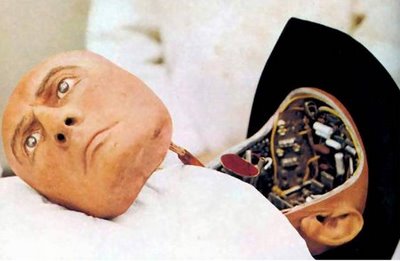The new technologies allow us to learn more about ourselves (when we’re not busy using them to delude ourselves), but the they also provide this information to corporations and governments. From “The Age of Digital Improvability,” Sunil Khilnani’s Livemint piece about the double-edged sword of the “self-quant” movement:
“In the past that technocratic ambition was associated with states and government—benign know-alls who would govern in the interests of the populace. That dream has now resurfaced, in a form more attractive to a generation mistrustful of government and the state, but enamored of their own capacity to manage their well-being.
Now, the dream of continuous self-improvement can be realized by our own actions, with our own gadgets. We can all now discover our own inner technocrat—that better self, who compiles the data, creates the databanks, and then seeks to regulate our behavior to bring it into line with ‘best practice.’ Like the mirror in the gym, digital tracking becomes a perpetually at-hand guide to make us self-aware of our patterns and habits—and, as with the mirror in the gym, it also lets us steal glances at the performance of others, so we can compare and improve.
And yet. Self-quantification may be a way of making us feel unique—creating our own individual number profile. But it also turns us into a statistic, an impersonal number that can be compared with others. The accumulation of large data sets on habits and actions, the creation of ranking systems for products, services, experiences—all this gives governments and policymakers, companies and organizations, the raw material through which to shape our behavior. New policy strategies are emerging, connecting such data with behavioral psychology.”
Tags: Sunil Khilnani

